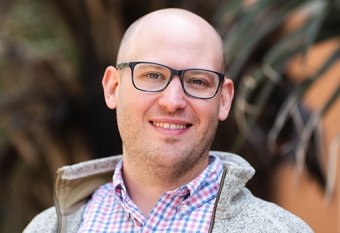
Joe Chada, an assistant teaching professor in the Chemical Engineering Department, has received the UC Santa Barbara Academic Senate’s 2022-’23 Distinguished Teaching Award for demonstrating excellence in teaching and contributing to the teaching mission of the university.
“I was shocked when my friend, Vanessa Woods, an associate teaching professor at UCSB who received the award last year, came to my class to announce that I had won,” said Chada, whose students erupted in applause after learning the news. “It’s humbling to be recognized by my peers and to know that my efforts are making a positive impact on our students and the department.”
Chada became the department’s first tenure-track teaching professor when he joined the faculty in fall 2018. Since then, graduating seniors have selected him as the Chemical Engineering Department Faculty of the Year recipient in each of the past three years. His primary role is to design and construct experiments for undergraduates that reflect the latest in the chemical engineering field. After navigating the challenges of online learning during the pandemic, Chada focused his efforts on revamping the department’s introductory series for first-year students.
“I wanted to make it fun and purposeful to be in class,” explained Chada.
Steering away from a lecture-centric course, he designed a biodiesel laboratory experience to expose students to industrially relevant situations, provide hands-on lab training on modern equipment, and enhance opportunities for students to succeed during and after their time at UCSB. Prior to this series, the department’s curriculum did not include a lab course until the second half of a student’s junior year.
“I want them to be comfortable in a professional lab setting similar to what they would see during an internship or a job,” said Chada. “By having access to professional-grade equipment and hands-on training, they will begin feeling like engineers as a freshman. Having a sense of belonging and comfort early on will set them on a path to success.”
Chada’s commitment to enhancing student success and promoting inclusivity drives his laudable actions. His vision for the new introductory series was to create an opportunity for more freshmen, even those who are not engineering majors, to be exposed to the basics of chemical engineering from the beginning. The class is open to all students, regardless of their majors, in the spring.
“Whether it is because of their socioeconomic backgrounds or life experiences, most high school students don’t grow up wanting to be a chemical engineer or think that it is possible,” said Chada. “This lab series will change that and open the door to chemical engineering for every freshman.”
During the quarter-long lab, first-year students will use vegetable oil and ethanol to produce biodiesel and glycerol by running an esterification reaction, and then separate the biodiesel, glycerol, and ethanol. Next, they will run a saponification reaction to make customized bars of soap with the glycerol, before finally using the biodiesel to run a small engine. The introductory lab series was made possible by a generous endowment from alumnus Douglas Asbury (’82) to create the Asbury Pathfinder Undergraduate Laboratory. Chada also manages the Chemical Engineering Department’s Undergraduate Robert G. Rinker Teaching Lab for juniors and seniors.
“Joe Chada creates challenging and relevant hands-on coursework, prioritizes inclusive teaching practices, and has an ability to relate to students from a wide variety of backgrounds,” said Rachel Segalman, professor and chair of the Chemical Engineering Department. “His long-term impact on students deserves commendation, and we are thrilled for him to receive the Distinguished Teaching Award.”
In addition to coursework, Chada also supports students from underrepresented backgrounds through his involvement with the Enhancing Success in Transfer Education for Engineering Majors (ESTEEM), a scholarship and support program for transfer students in engineering.



